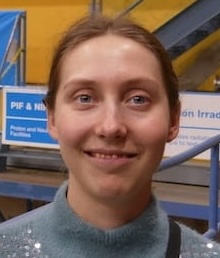EPE Seminar: Jennifer Ott
PAT C-421
Title: Semiconductor detectors for imaging and 4D(5D) tracking
Abstract: Particle physics experiments pose challenging requirements on semiconductor detectors: fine segmentation and precise timing resolution are required simultaneously with low power consumption, low mass and high radiation tolerance.
I will discuss ongoing developments and future directions for ultrafast semiconductor detectors in high-energy and nuclear physics, and outline my research activities at the University of Hawai’i. The presentation focuses on the characterization of low-gain avalanche diodes as well as fast timing readout circuits for the ePIC detector Time-of-Flight Particle ID detector and the PIONEER experiment Active Target, and the integration of thin film technology into radiation detectors. I will also touch on the aspects of interdisciplinary collaboration and education within instrumentation, and its potential for technology exchange with other fields of science and technology, for example medical imaging.
Bio: Dr. Jennifer Ott is an assistant professor at the University of Hawai’i at Mānoa in the Department of Electrical & Computer Engineering, specialising in ultrafast silicon sensors and readout electronics. Dr. Ott received her B.Sc. in 2014 and M.Sc. in 2015 in radiochemistry from the University of Helsinki, Finland, taking first steps into research on radioactive tracers and radiation detection technology. She continued to pursue a doctoral degree in Advanced Materials and Photonics under joint supervision by Helsinki Institute of Physics and Aalto University School of Electrical Engineering, focusing on the fabrication of silicon pixel sensors that utilize thin films grown by atomic layer deposition as resistive and dielectric layers. In 2021 Dr. Ott moved to the University of California, Santa Cruz as a postdoctoral fellow to study precision tracking and timing sensors, as well as novel readout electronics, for high-energy and nuclear physics experiments. This included the electrical testing of pixel modules for the upgrade of the ATLAS experiment, and research towards the future ePIC and PIONEER experiments. Dr. Ott joined the Department of Electrical and Computer Engineering at UH as assistant professor in January 2025, along with a cooperating graduate faculty appointment in the Department of Physics & Astronomy, continuing and expanding on her instrumentation expertise to advance the integration of Machine Learning and Artificial Intelligence into front-end electronics.

